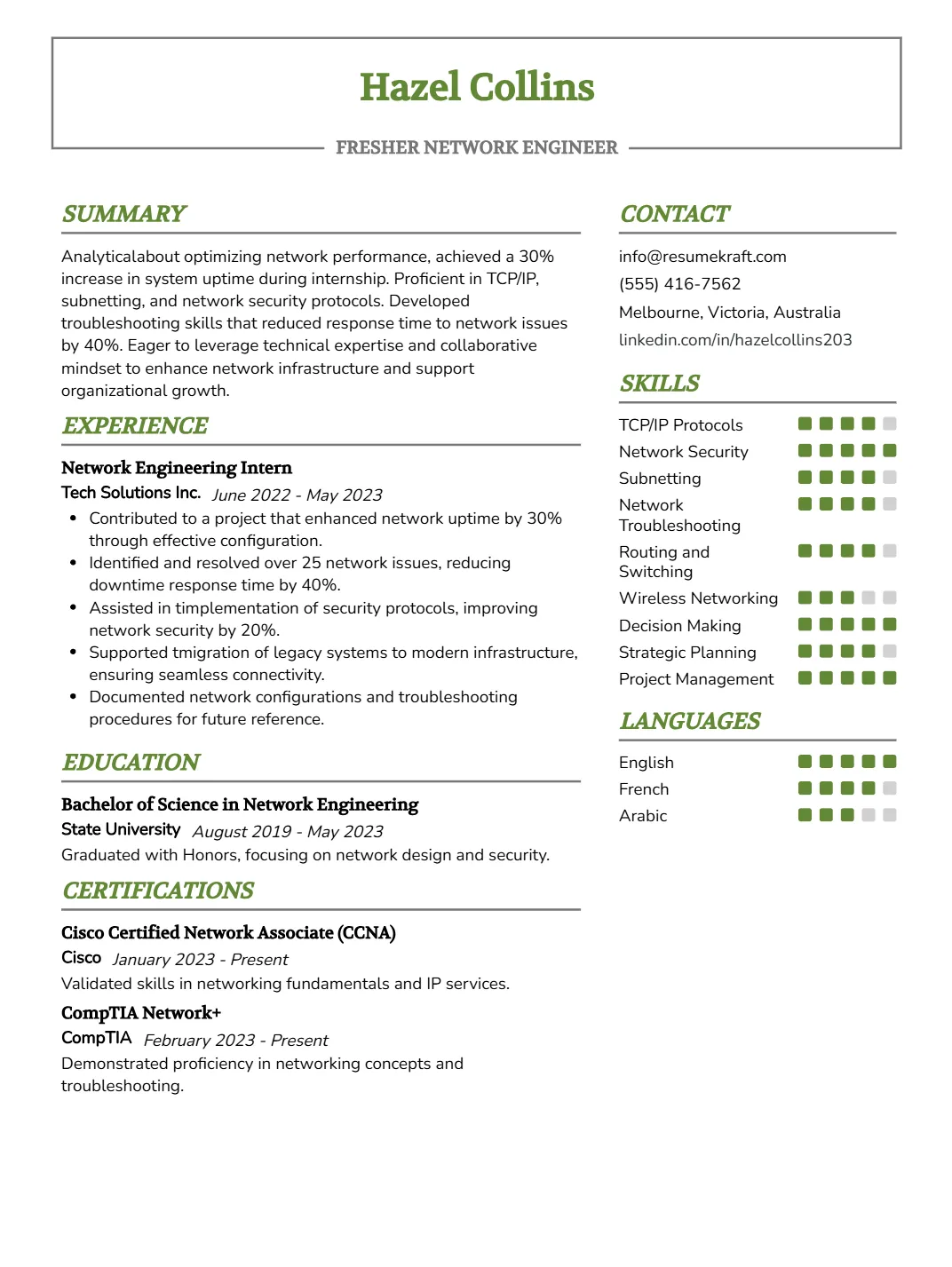
As a fresher Network Engineer, you play a crucial role in maintaining and optimizing the connectivity that keeps organizations running smoothly. This entry-level position involves tasks such as troubleshooting network issues, configuring hardware, and ensuring seamless communication within the company. With the increasing reliance on technology, the demand for skilled network engineers is on the rise, making this career path an exciting opportunity for new graduates. However, crafting a compelling resume can be challenging due to limited work experience. This article will guide you in presenting your skills, academic projects, and internships effectively, helping you stand out in today’s competitive job market.
-
- Fresher Network Engineer resume examples
- Fresher Network Engineer resume format
- Fresher Network Engineer resume with no experience
- How to list your hard skills and soft skills on your fresher resume
- How to list your education and certifications on your fresher resume
- How to write your fresher Network Engineer resume summary or objective
- Additional sections for a fresher Network Engineer resume
- Key takeaways for writing a professional fresher Network Engineer resume
- Frequently Asked Questions for Fresher Network Engineer Resumes
Fresher Network Engineer resume examples
Fresher Network Engineer resume examples are essential for new graduates and entry-level job seekers as they provide valuable insights into what recruiters seek in emerging talent. These examples serve as a guide, helping beginners effectively showcase their academic achievements, internships, and relevant projects, even without extensive work experience. By understanding the key elements that attract employers, freshers can create compelling resumes that highlight their potential and readiness to contribute to the workforce.
Fresher Network Engineer Resume

Why This Resume Works
This resume effectively showcases the candidate’s relevance for a Fresher Network Engineer position by highlighting essential skills like TCP/IP protocols, network security, and troubleshooting. The structured format emphasizes their practical experience as a Network Engineering Intern, making it easy for hiring managers to assess qualifications quickly. Additionally, the use of industry-specific keywords enhances ATS compatibility, ensuring visibility in applicant tracking systems. Strategically presenting achievements related to routing and switching further aligns the candidate’s profile with job expectations, making this resume stand out.
Entry-Level Network Engineer Resume
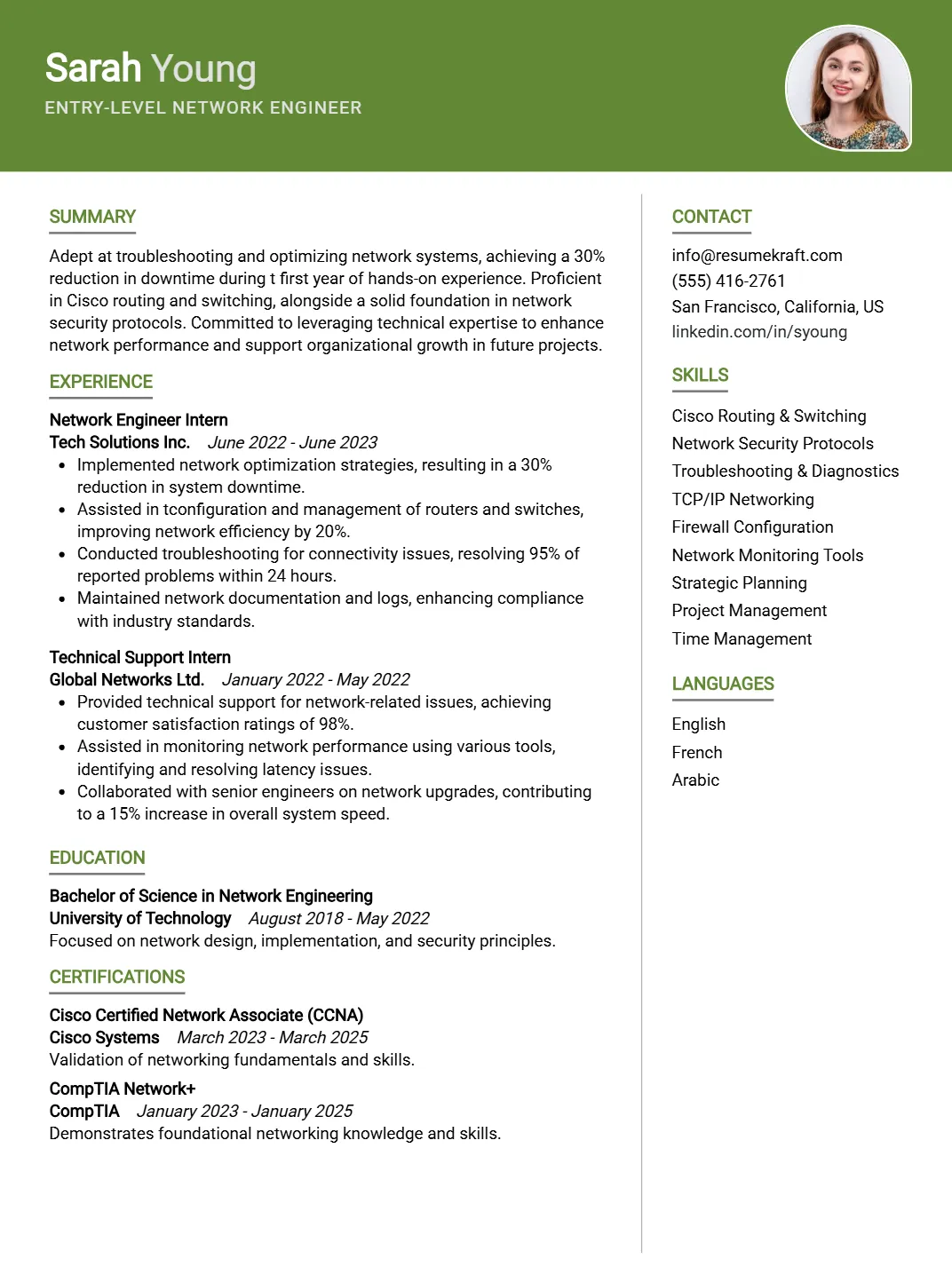
Why This Resume Works
This resume effectively positions the candidate for an Entry-Level Network Engineer role by highlighting essential skills like Cisco Routing & Switching and Network Security Protocols, directly aligning with industry demands. The structured format enhances readability, while clear sections for experience and skills promote quick assessment by hiring managers. Additionally, the use of relevant keywords ensures ATS compatibility, increasing visibility to recruiters. By showcasing practical achievements from internships in troubleshooting and diagnostics, the resume underscores the candidate’s readiness to contribute immediately in this field.
Junior Network Engineer Resume
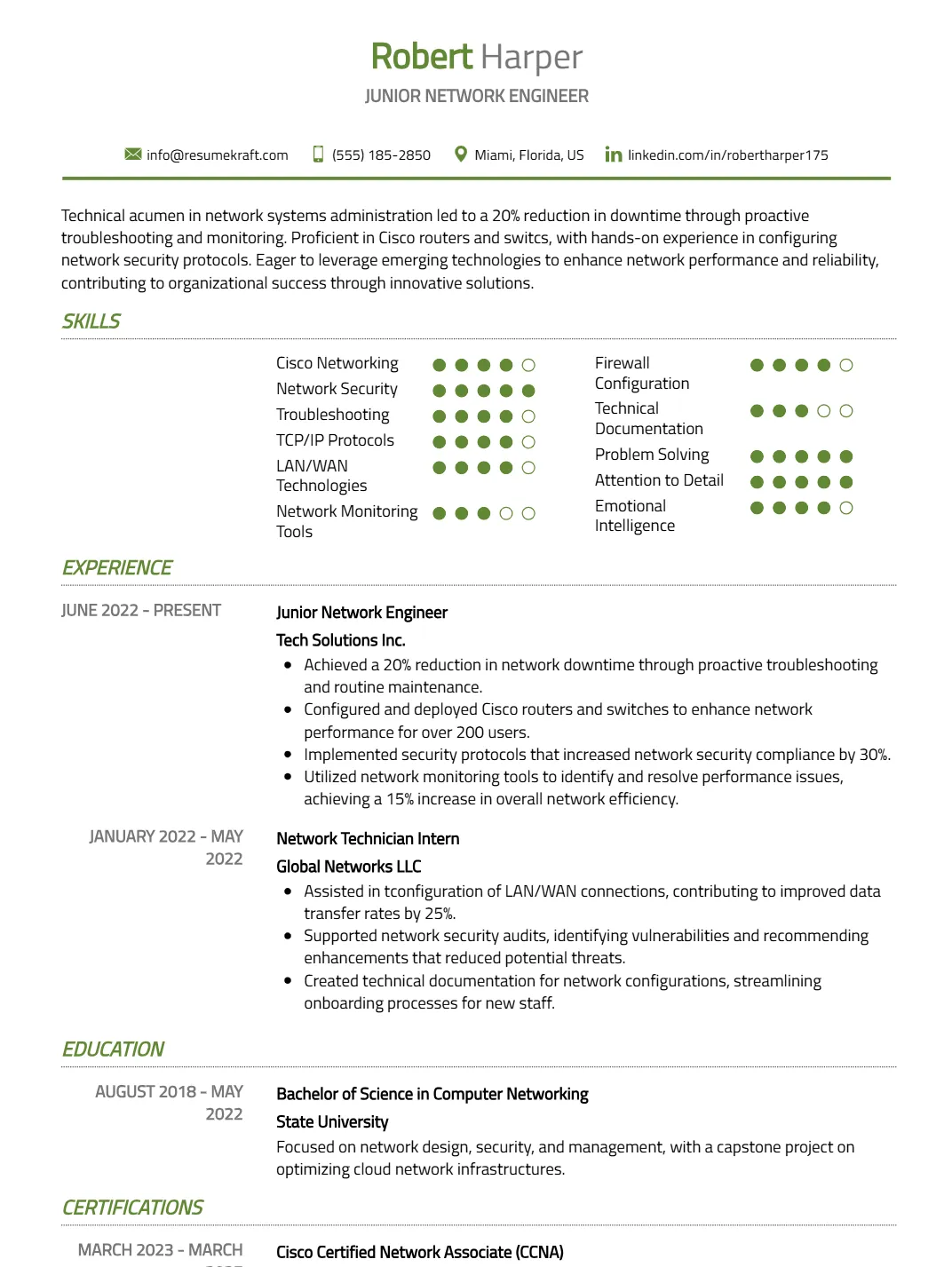
Why This Resume Works
This resume effectively highlights the candidate’s relevant skills, such as Cisco Networking and Network Security, which are essential for a Junior Network Engineer role. With three years of experience as a Junior Network Engineer and a Network Technician Intern, it showcases hands-on expertise. The structured format emphasizes key accomplishments, making it easy to read. Additionally, the use of industry-specific keywords enhances ATS compatibility, ensuring visibility in applicant tracking systems. Overall, this resume strategically presents qualifications that align well with the demands of the position.
Beginner Network Engineer Resume
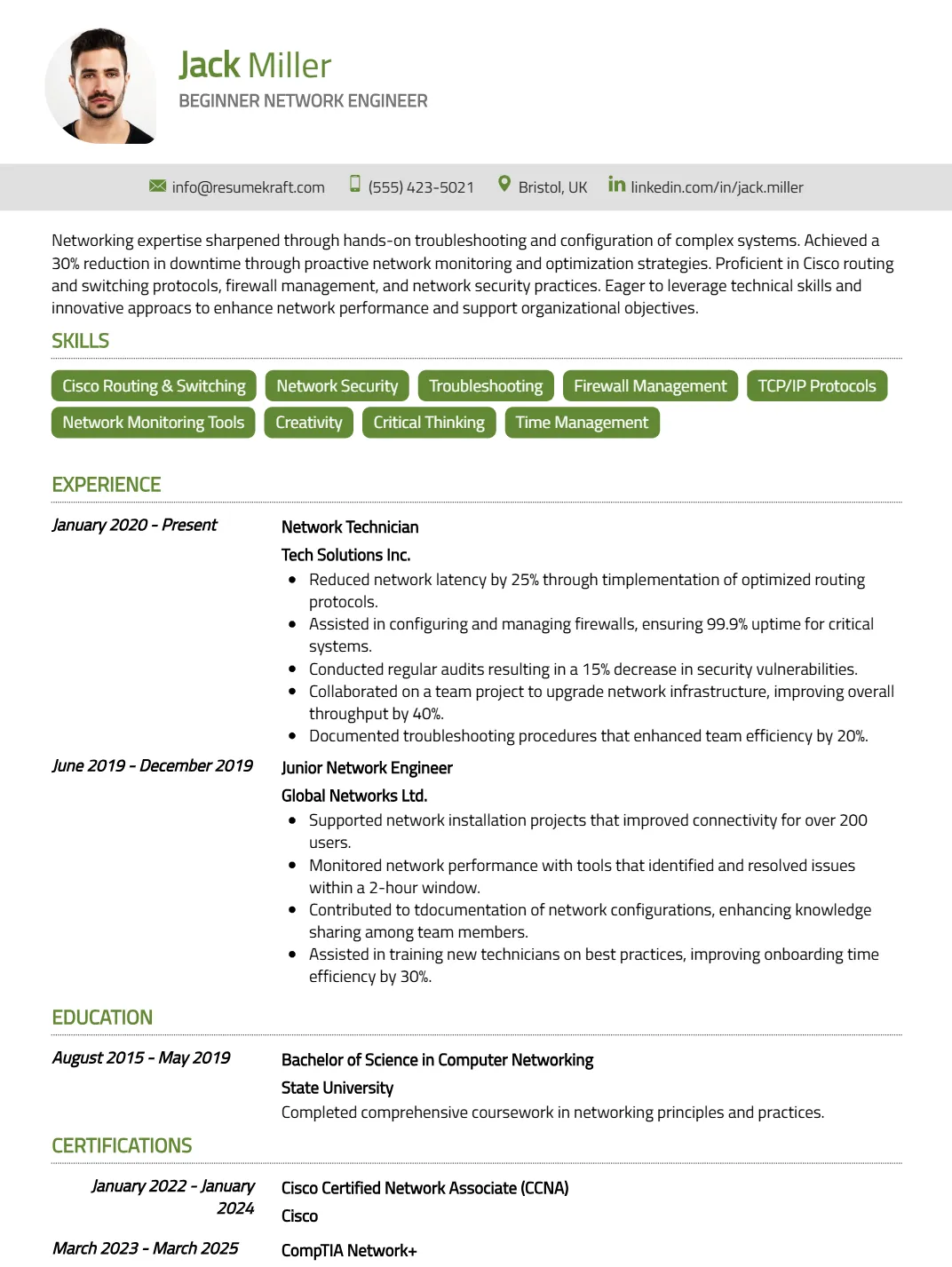
Why This Resume Works
This resume effectively highlights relevant skills such as Cisco Routing & Switching and Network Security, directly aligning with the requirements of a Beginner Network Engineer position. The candidate’s five years of experience in roles like Network Technician and Junior Network Engineer showcase practical knowledge that stands out. Its clear format and structured sections enhance readability, ensuring ATS compatibility. Additionally, strategically presented achievements emphasize troubleshooting success and firewall management, making a compelling case for the candidate’s fit in this competitive field.
Student Network Engineer Resume
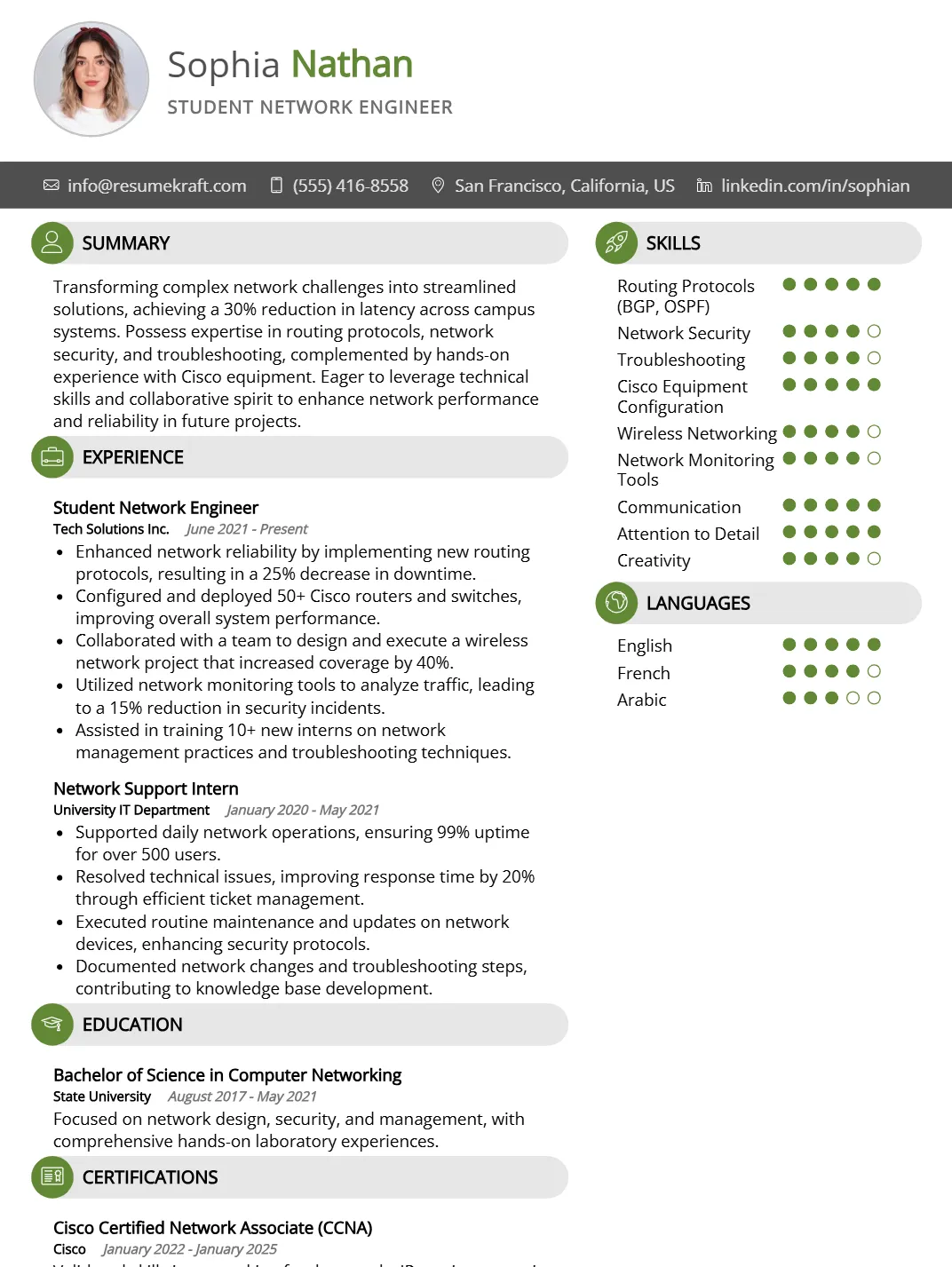
Why This Resume Works
This resume effectively highlights the candidate’s strong technical skills in routing protocols, network security, and Cisco equipment configuration, directly aligning with the requirements of a Student Network Engineer. The structured format emphasizes relevant experience as a Student Network Engineer and Network Support Intern, showcasing nearly five years of hands-on expertise. Additionally, the use of industry-specific keywords enhances ATS compatibility, ensuring visibility to recruiters. Strategic presentation of achievements underlines problem-solving capabilities and practical knowledge, making this resume compelling for potential employers in networking.
No-Experience Network Engineer Resume
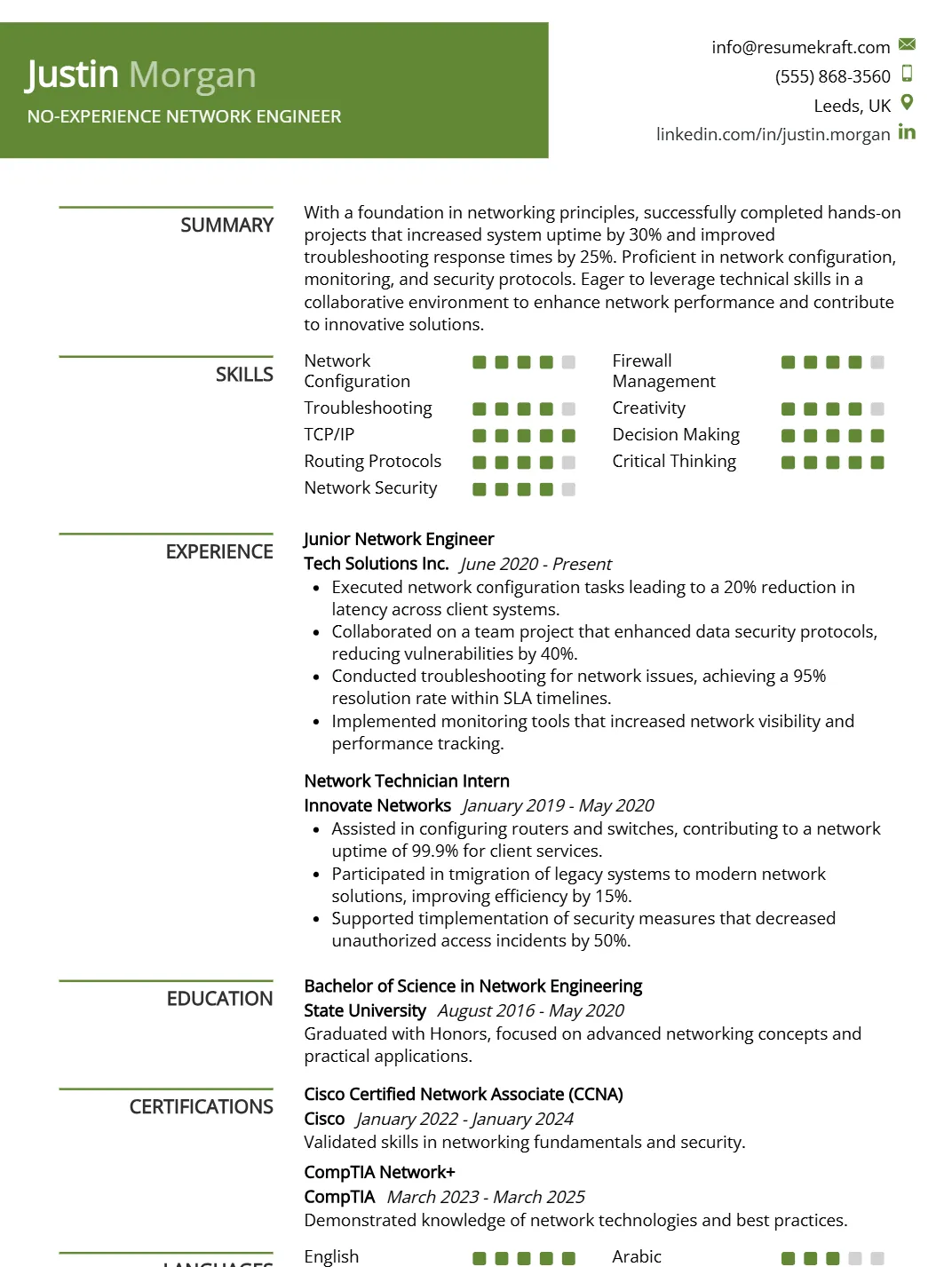
Why This Resume Works
This resume effectively positions the candidate for a No-Experience Network Engineer role by highlighting relevant skills such as Network Configuration and Troubleshooting, which are crucial for entry-level positions. The structure is clear and organized, making it easy for hiring managers to identify key qualifications. It incorporates industry-specific keywords to ensure ATS compatibility, increasing visibility in applicant tracking systems. Additionally, the presentation of achievements from the Junior Network Engineer and internship experiences demonstrates practical knowledge that aligns with job expectations in networking.
Network Engineer Intern Resume
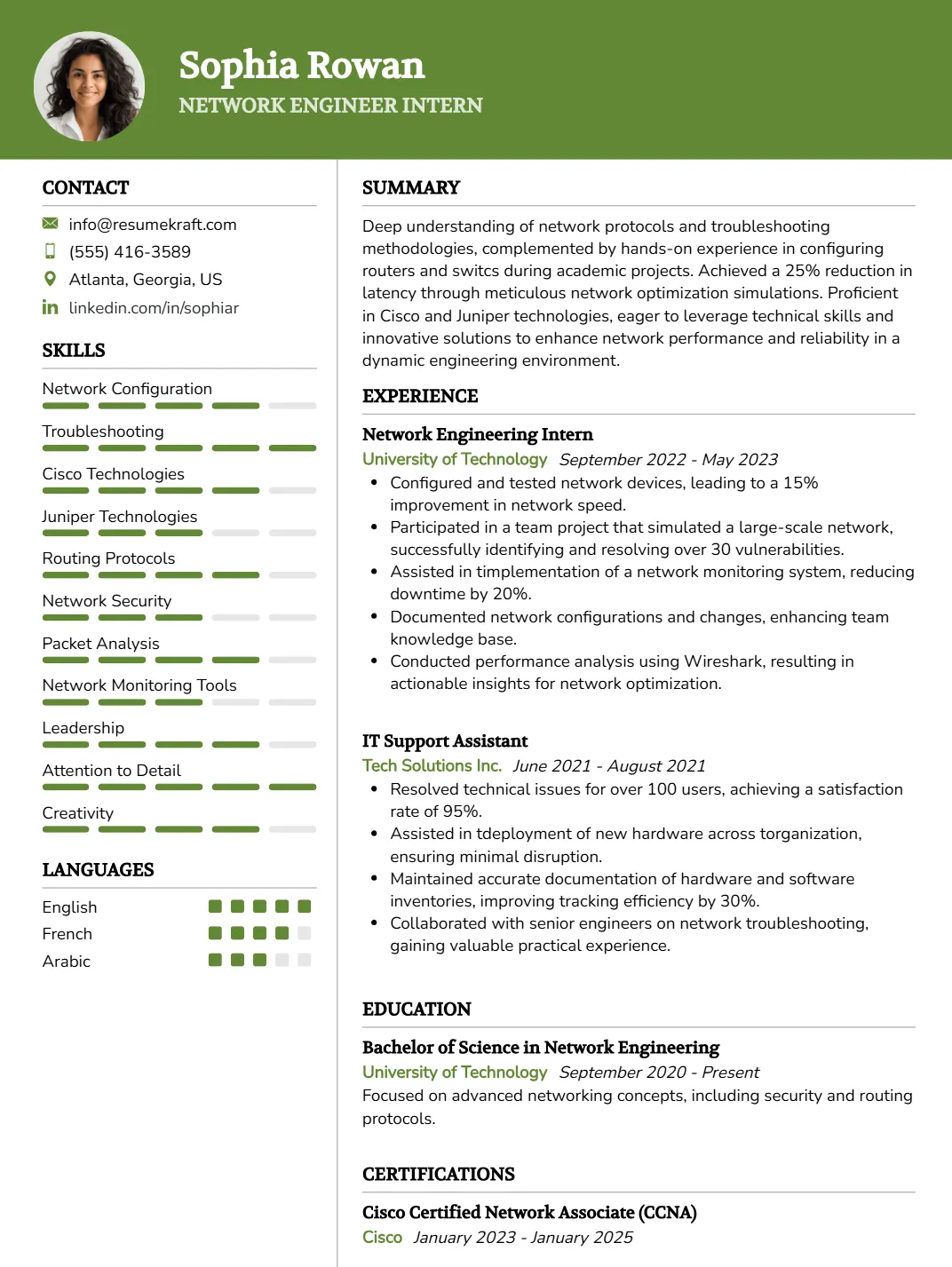
Why This Resume Works
This resume effectively targets the Network Engineer Intern position by prominently showcasing relevant skills such as network configuration and troubleshooting, alongside proficiency in Cisco and Juniper technologies. The structured format highlights essential experience, including a dedicated internship and IT support role, demonstrating practical application of knowledge. By incorporating industry-specific keywords, the resume enhances ATS compatibility, ensuring visibility to recruiters. Additionally, strategic presentation of achievements emphasizes technical prowess and problem-solving abilities, positioning the candidate as a strong fit for the role.
Network Engineer Fresher Resume
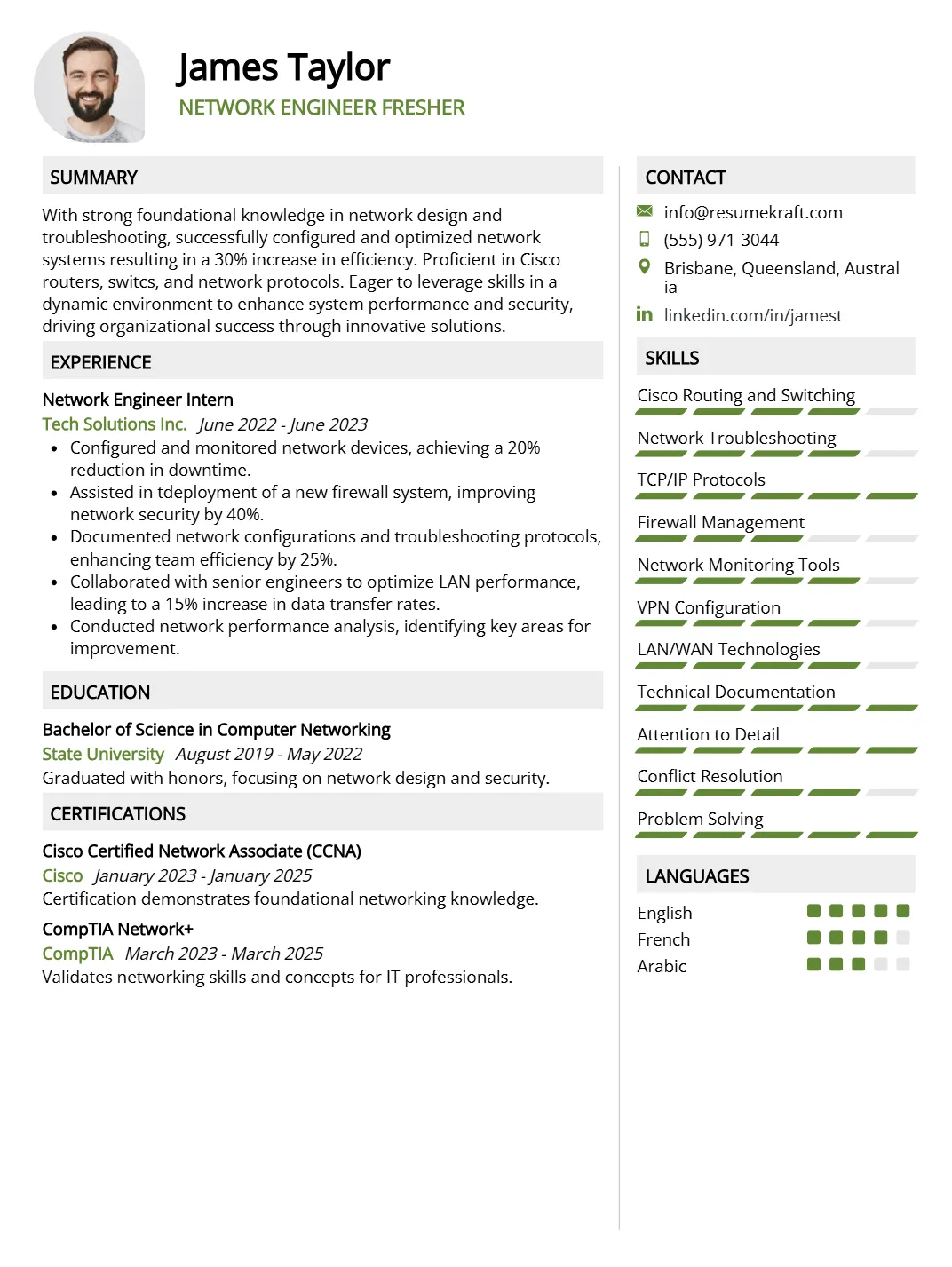
Why This Resume Works
This resume effectively showcases the candidate’s qualifications for a Network Engineer Fresher position by highlighting relevant skills such as Cisco Routing and Switching, alongside practical experience gained during a year-long internship. The clear format emphasizes technical competencies essential for the role, ensuring easy readability. Additionally, it employs industry-specific keywords that enhance ATS compatibility, increasing visibility to recruiters. Strategic presentations of achievements in network troubleshooting and firewall management further demonstrate readiness to contribute effectively in a professional environment, making this resume stand out.
Trainee Network Engineer Resume
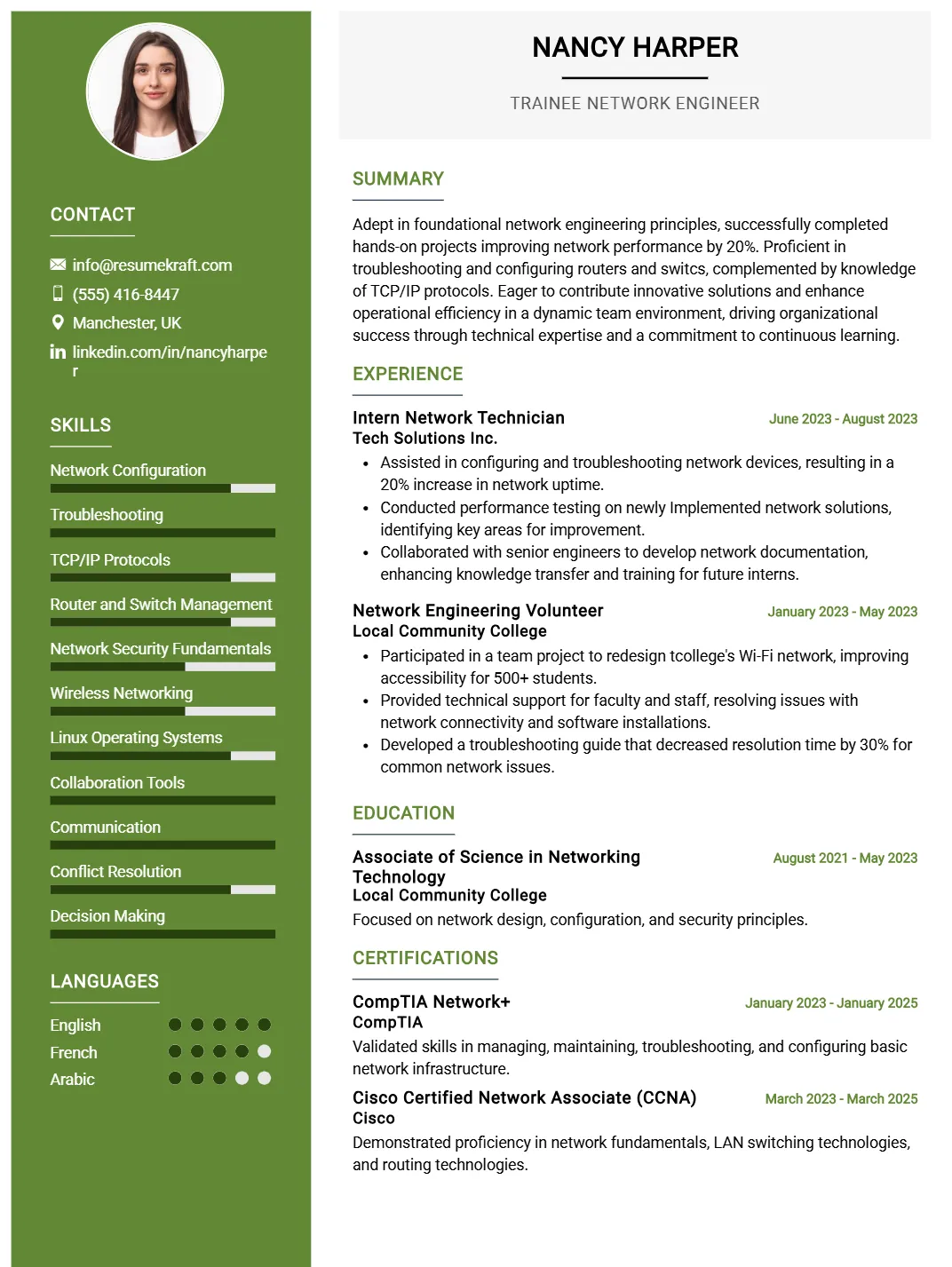
Why This Resume Works
This resume effectively showcases the candidate’s relevant skills and experience for a Trainee Network Engineer position by highlighting key competencies such as network configuration, troubleshooting, and TCP/IP protocols. The structured format emphasizes hands-on experience in roles like Intern Network Technician and Network Engineering Volunteer, making it easy for hiring managers to assess qualifications quickly. Its alignment with ATS algorithms ensures optimal visibility in applicant tracking systems, while strategically presented achievements underline the candidate’s proactive approach to network security fundamentals, directly appealing to industry needs.
Graduate Network Engineer Resume
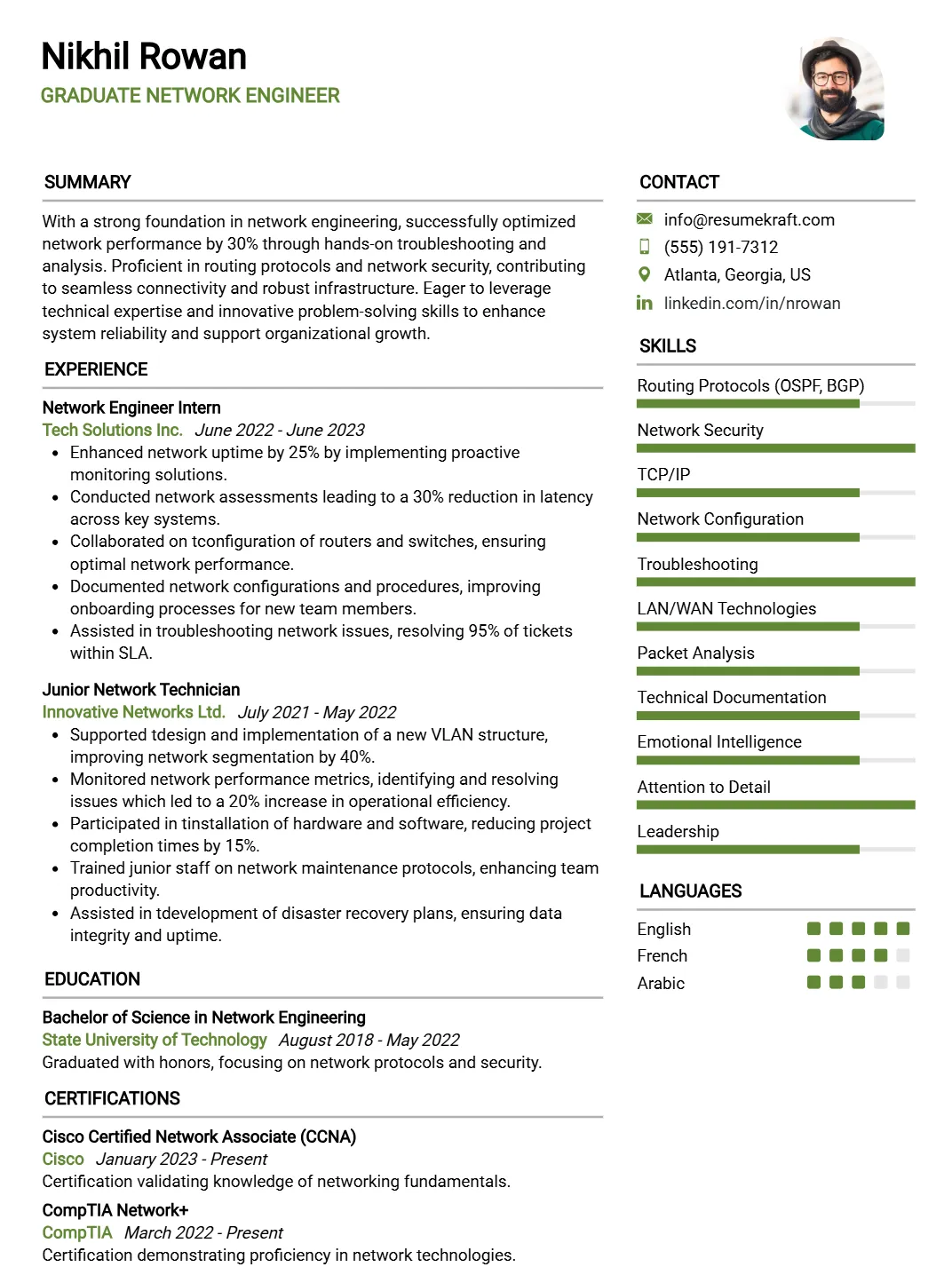
Why This Resume Works
This resume effectively positions the candidate for a Graduate Network Engineer role by highlighting key skills such as OSPF, BGP, and network security, directly relevant to the job. The structured format allows for easy navigation, showcasing approximately two years of hands-on experience in network engineering through internships and technician roles. Additionally, it is optimized for ATS compatibility with clear keywords from the industry. The strategic presentation of achievements emphasizes practical troubleshooting and configuration successes, making it compelling to potential employers in this field.
New Graduate Network Engineer Resume
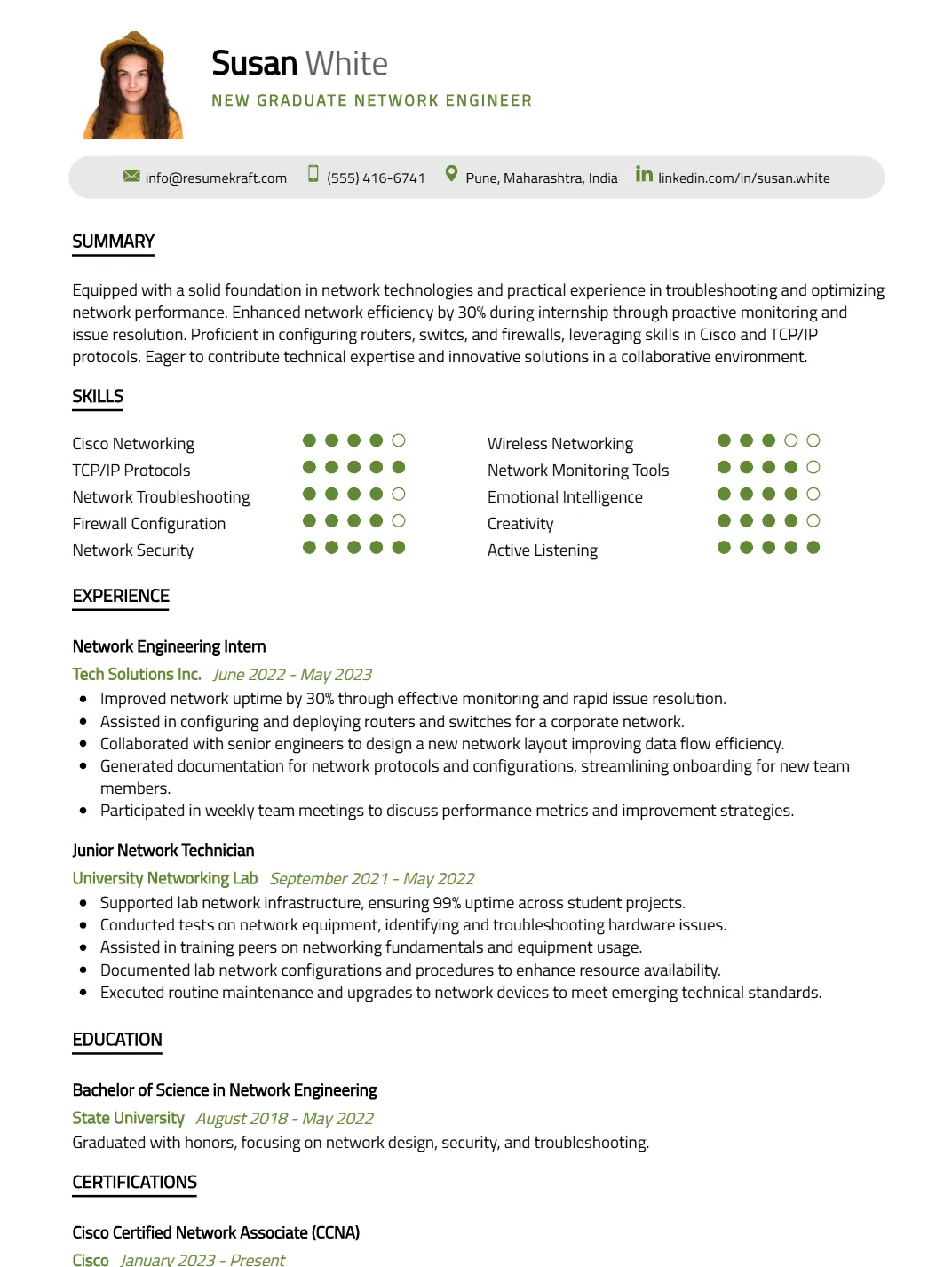
Why This Resume Works
This resume effectively positions the candidate for a New Graduate Network Engineer role by highlighting essential skills such as Cisco Networking and TCP/IP Protocols, directly relevant to the job. With approximately two years of practical experience as a Network Engineering Intern and Junior Network Technician, it demonstrates hands-on expertise in network troubleshooting and security. The format is clear and concise, enhancing readability, while strategic keyword usage ensures ATS compatibility.
Entry level Network Engineer Resume
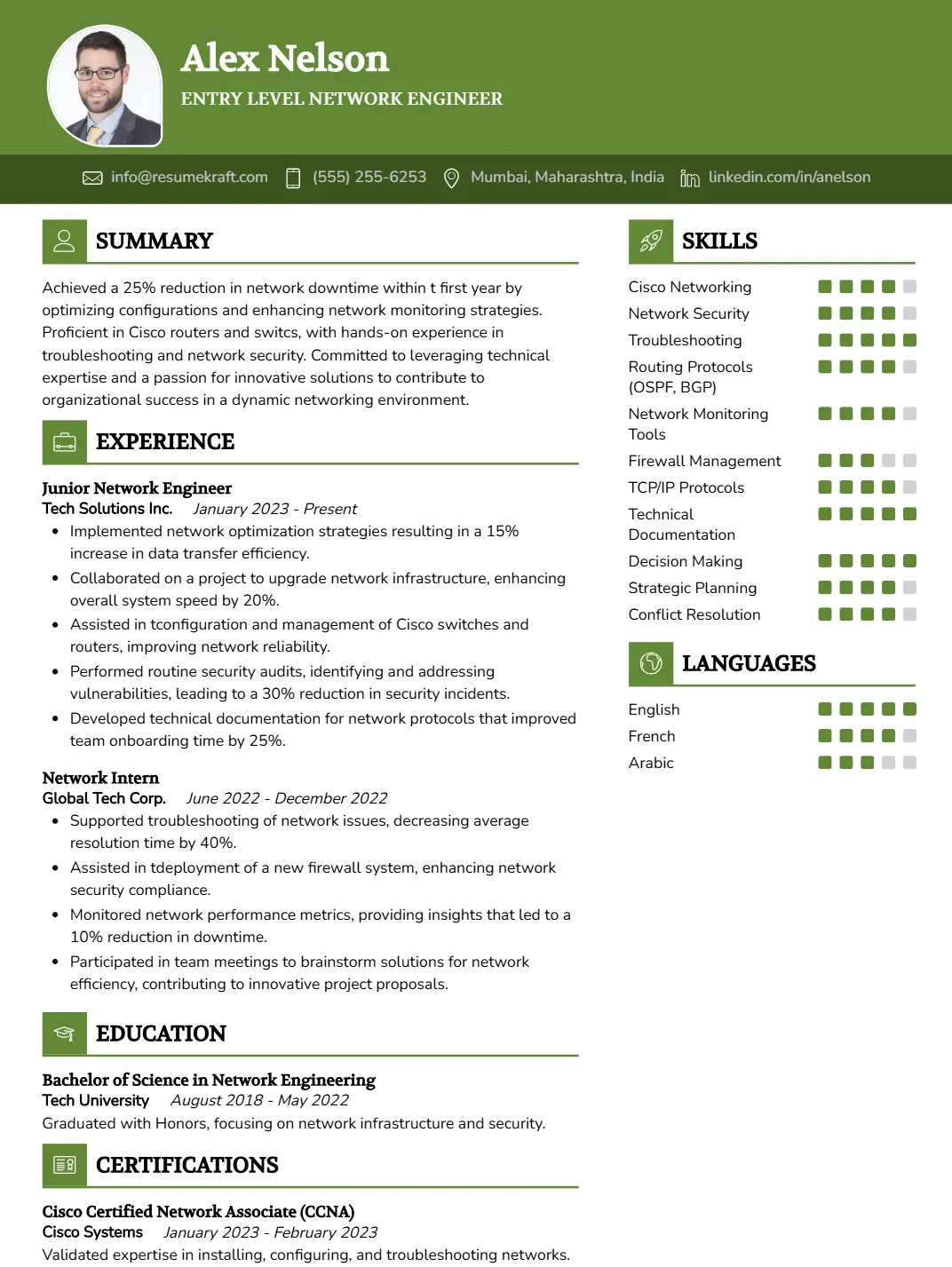
Why This Resume Works
This resume effectively targets the Entry Level Network Engineer position by highlighting essential skills like Cisco Networking and Routing Protocols, which are crucial for the role. The two years of relevant experience as a Junior Network Engineer and intern demonstrate practical knowledge in network security and troubleshooting. Its clear structure enhances readability, while incorporating industry-specific keywords ensures ATS compatibility. Additionally, the strategic presentation of achievements showcases a proactive approach to problem-solving, making it appealing to potential employers in the networking field.
Fresher Network Engineer resume format
Proper formatting is crucial for a fresher Network Engineer resume, as it directly influences how hiring managers perceive candidates. An effective resume format ensures clarity and showcases skills, helping new graduates make a strong first impression in a competitive job market.
- Use a clean, professional layout with clear headings to separate sections like Education, Skills, and Projects. This enhances readability and allows recruiters to find key information quickly.
- Opt for a simple font such as Arial or Calibri, sized between 10-12 points. Consistent font style and size across the document maintain professionalism and ensure your resume is easy to read.
- Keep your resume to one page, focusing on relevant academic projects and skills. A concise format prevents overwhelming recruiters and highlights the most pertinent information for entry-level roles.
- Utilize bullet points for listing responsibilities and achievements in projects or internships. This format improves clarity and allows you to present information succinctly, making it more impactful.
- Include white space strategically to avoid clutter. Adequate margins and spacing between sections help your resume look organized, drawing attention to your qualifications without overwhelming the reader.
Fresher Network Engineer resume with no experience
Freshers with no work experience can still create an impressive Network Engineer resume by emphasizing their academic projects, relevant coursework, and personal initiatives. Highlighting detailed descriptions of projects that involved networking concepts, including any simulations or labs completed during studies, can demonstrate your comprehension of core principles. Additionally, showcasing transferable skills from volunteer work or extracurricular activities, such as teamwork and problem-solving, can illustrate your readiness for the role.
No work experience in networking, but I studied network fundamentals in college.
Developed a simulated network for a class project, designing and configuring routers and switches, while collaborating in a team to troubleshoot connectivity issues, demonstrating both technical and teamwork skills.
How to list your hard skills and soft skills on your fresher resume
In the competitive field of network engineering, showcasing both hard and soft skills on a resume is crucial for freshers. New graduates can leverage their academic knowledge, online courses, certifications, and personal projects to demonstrate their relevant skills effectively. Highlighting technical competencies alongside interpersonal abilities not only sets candidates apart but also illustrates their potential to contribute to a team and adapt to the demands of the role.
Hard Skills for Fresher Network Engineer:
- Networking Fundamentals: Understanding of TCP/IP, OSI model, and subnetting concepts.
- Routing and Switching: Familiarity with Cisco routers and switches, including basic configuration.
- Network Security: Knowledge of firewalls, VPNs, and security protocols.
- Wireless Networking: Understanding of Wi-Fi standards and configuration.
- Network Troubleshooting: Ability to diagnose and resolve connectivity issues using tools like ping, traceroute, and Wireshark.
- Network Monitoring: Experience with network monitoring tools to analyze performance and identify issues.
- Operating Systems: Proficiency in Windows and Linux operating systems.
- Cloud Networking: Basic understanding of cloud services like AWS or Azure.
- Programming/Scripting: Familiarity with Python or Bash for automation and scripting tasks.
- Virtualization: Knowledge of virtual networking concepts and tools like VMware.
- DNS and DHCP: Understanding of Domain Name System and Dynamic Host Configuration Protocol.
- IP Addressing: Proficient in IPv4 and IPv6 addressing schemes.
- Network Documentation: Ability to create network diagrams and documentation for systems.
- Basic Hardware Knowledge: Familiarity with networking hardware components and their functions.
- Certifications: Completion of relevant certifications like CompTIA Network+ or Cisco CCNA.
Soft Skills for Entry-Level Network Engineer:
- Problem-Solving: Ability to analyze problems and develop effective solutions quickly.
- Communication: Strong verbal and written communication skills to explain technical concepts clearly.
- Teamwork: Willingness to collaborate with colleagues and share knowledge for project success.
- Adaptability: Flexibility to learn new technologies and adjust to changing environments.
- Attention to Detail: Meticulous approach to network configurations and troubleshooting.
- Time Management: Ability to prioritize tasks and manage time effectively to meet deadlines.
- Critical Thinking: Capacity to evaluate situations logically and make informed decisions.
- Customer Service: Understanding the importance of supporting end-users and addressing their needs.
- Continuous Learning: Enthusiasm for ongoing education and skill development in technology.
- Initiative: Proactive approach to taking on responsibilities and seeking opportunities for improvement.
- Organizational Skills: Ability to maintain organized documentation and project files.
- Conflict Resolution: Skills to manage and resolve conflicts effectively within a team.
- Interpersonal Skills: Ability to build relationships and work harmoniously with diverse groups.
- Creativity: Innovative thinking to develop unique solutions for network challenges.
- Resilience: Capability to handle setbacks and maintain motivation in challenging situations.
How to list your education and certifications on your fresher resume
To effectively present their education on a Network Engineer resume, freshers should focus on detailing relevant coursework, certifications, and academic projects. Highlighting specific subjects like Network Security, Routing Protocols, and Wireless Communications can demonstrate specialized knowledge. Including projects such as designing a small-scale network or participating in hackathons can showcase practical skills and hands-on experience, making the resume more compelling even without professional experience.
Freshers should also mention any academic achievements, such as honors or scholarships, to further bolster their credentials. This information can create a well-rounded picture of their capabilities, indicating that they are not only knowledgeable but also proactive and committed to their field.
Bachelor’s in Computer Science. Learned some networking stuff.
Bachelor’s in Computer Science, focusing on Networking. Completed projects on network design and security protocols, achieving a top score in my capstone project. Relevant coursework includes Network Security, Data Communication, and Cloud Computing.
How to write your fresher Network Engineer resume summary or objective
A strong resume summary or objective is crucial for freshers applying for a Network Engineer position, as it serves as the first impression to potential employers. Entry-level candidates should craft compelling opening statements that highlight their enthusiasm for technology, relevant coursework, and any hands-on experience, such as academic projects or internships. Freshers should use a summary when they have some relevant experience or skills to showcase, while an objective is more suited for those with limited experience, focusing on their career goals and eagerness to learn.
Recent graduate looking for a job in networking. I want to work at your company.
Enthusiastic recent graduate with a degree in Computer Science, eager to apply networking skills gained through academic projects and internships, aiming to contribute to innovative solutions in a dynamic Network Engineer role.
Additional sections for a fresher Network Engineer resume
For fresher Network Engineer candidates, additional resume sections can significantly enhance their profiles by highlighting their potential, adaptability, and proactive learning. These sections allow candidates to showcase relevant projects, volunteer experiences, and achievements that reflect their skills and dedication to the field.
- Projects: Including academic or personal projects demonstrates your practical knowledge of networking concepts. Highlight specific technologies used and the challenges you overcame, showcasing your problem-solving abilities.
- Certifications: Listing relevant certifications, such as CompTIA Network+ or Cisco CCNA, indicates your commitment to professional development. These credentials reflect your understanding of networking principles, even without work experience.
- Volunteer Work: Participation in volunteer activities, especially those involving technology or networking, illustrates your ability to apply skills in real-world scenarios. It also highlights your teamwork and leadership qualities.
- Academic Achievements: Mentioning honors, awards, or notable grades in relevant courses can indicate your understanding of key networking concepts. This section highlights your dedication and capacity for learning in the field.
- Technical Skills: A dedicated skills section can spotlight your proficiency in networking tools and technologies. Emphasize both hard and soft skills, such as troubleshooting, communication, or teamwork, to show versatility and readiness for the role.
Key takeaways for writing a professional fresher Network Engineer resume
- Highlight relevant coursework and projects that showcase your understanding of networking concepts, protocols, and tools, demonstrating your knowledge even without formal work experience.
- Use resume templates specifically designed for freshers to structure your resume clearly, emphasizing your education, skills, and any internships or projects.
- Include any certifications like CompTIA Network+ or Cisco CCNA to bolster your credibility and show your commitment to entering the networking field.
- List technical skills such as TCP/IP, routing and switching, and network security, which can help you stand out and align with job requirements.
- Consider using an ai resume builder to create a polished resume that effectively showcases your skills, academic achievements, and relevant projects, maximizing your appeal to potential employers.
Frequently Asked Questions for Fresher Network Engineer Resumes
How long should my fresher Network Engineer resume be?
Your resume as a fresher Network Engineer should ideally be one page long. This concise format allows you to present your qualifications effectively without overwhelming hiring managers. Since you may have limited experience, focus on showcasing your academic achievements, relevant coursework, certifications, and personal projects. A one-page resume makes it easier for recruiters to quickly assess your qualifications and potential, which is crucial for entry-level positions.
What is the best format for a fresher Network Engineer resume?
The best format for a fresher Network Engineer resume is a chronological format, starting with your education, followed by skills, certifications, and any projects or internships. This structure highlights your academic background and relevant technical skills upfront, which are critical for entry-level roles. Use clear headings and bullet points for easy readability, ensuring that your resume is visually appealing and straightforward. This format helps employers quickly identify your qualifications and potential fit for the role.
How can I make my fresher Network Engineer resume stand out without work experience?
To make your resume stand out as a fresher Network Engineer, emphasize your technical skills, academic projects, and any relevant certifications. Highlight projects that demonstrate your problem-solving abilities and familiarity with networking concepts. Include any volunteer work, internships, or lab experience that relates to networking. Tailor your resume to match the job description, using keywords that reflect the skills and qualifications sought by employers. A well-structured and visually appealing resume can also help you make a strong impression.
What should I include in my fresher Network Engineer resume if I have no relevant experience?
If you lack relevant work experience, focus on including your educational background, relevant coursework, and any internships or projects related to networking. Be sure to list technical skills such as familiarity with networking protocols, hardware, or software tools. Certifications like CompTIA Network+ or Cisco CCNA can also add value. Additionally, consider including any group projects that demonstrate teamwork and problem-solving skills, as these are essential in network engineering roles.

